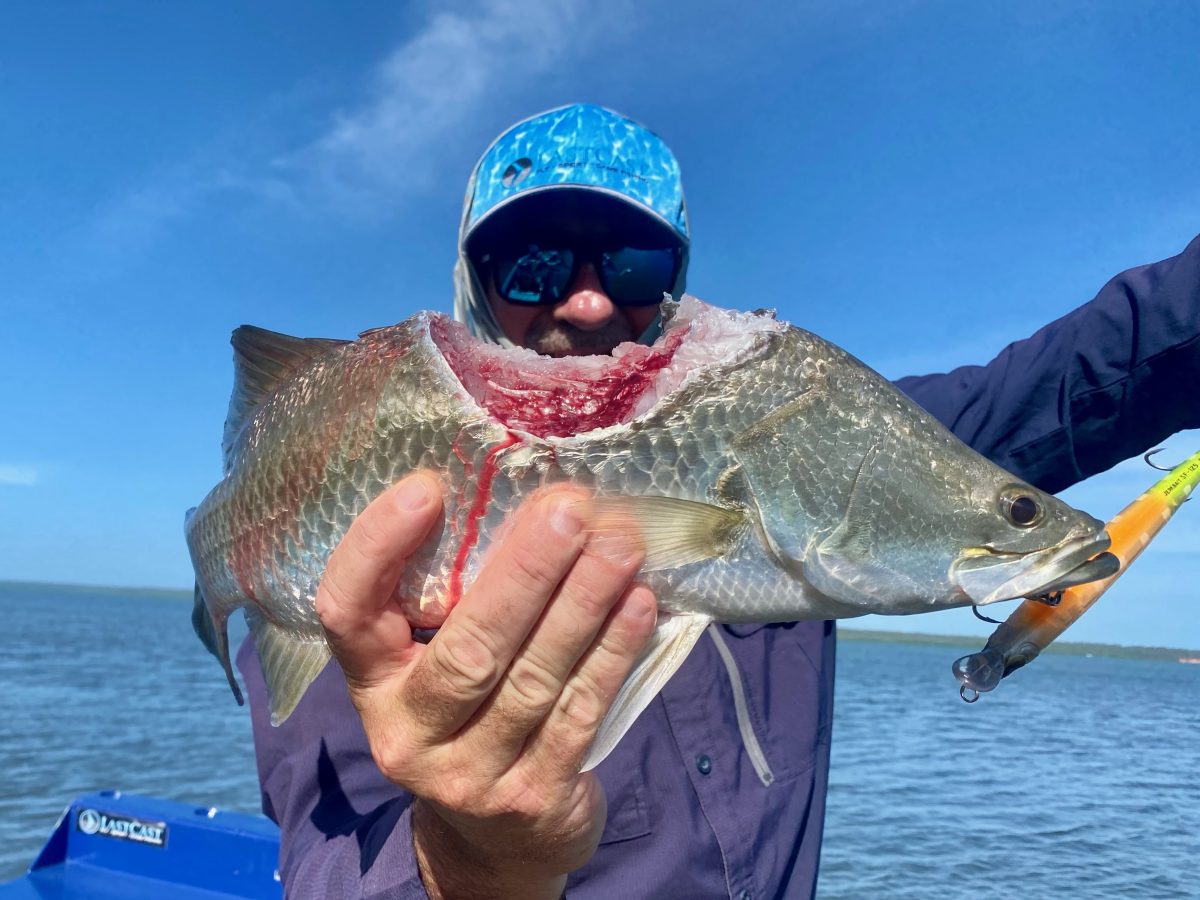
Shark depredation – more commonly called “sharking” – is causing some Cape York charter operators to consider walking away from the business as a State Government-led project aims to work out how to tackle the growing problem. Photo: Supplied.
A Weipa charter operator says the sheer scale of the shark depredation problem in the western Cape York fishery is causing him to consider walking away from the industry.
Shark depredation – or “sharking” as it is more commonly known among anglers – occurs when a hooked fish is completely or partially consumed by a shark before it can be reeled in by a fisher.
Researchers from the State Government Department of Agriculture and Fisheries are currently leading a two-year project to find a solution to the depredation problem but Weipa Billfish Club president Ben Bright, who also runs part-time charters from the township, said it may not be enough to stop operators like him from packing up their tackle.
“This season has been the worst shark depredation incidents we’ve had – it’s really concerning,” he said.
“It’s like a sledgehammer to us.
“It happens all the time; 20 years ago, you’d think nothing of going down the coast chasing pelagic fish and it wouldn’t be unusual to catch 20, 30, 40 individual fish – nowadays, that’s almost off the cards.
“I’ve effectively stopped going offshore; I hate to say it, but you basically have to stop fishing.
“What sells Weipa is its diversity, so if I talk them out of going pelagic fishing, that removes that diversity appeal for customers, but I just don’t see offshore as a viable option.”
The three-phase research project, which runs from March 2024 until October 2026, will seek to identify “potential solutions from measures currently or previously trialled around the world, utilising information from scientific papers, technical reports and fishers”.
Mr Bright said he was concerned about the sustainability of the local fishery and anecdotal evidence suggesting sharks had learnt to follow boats to wait for a “free feed” when a fish was hooked.
“The same number of fish are still dying, even if you aren’t able to catch them and pull them out of the water before a shark gets them; you’re actually adding to the problem [by not addressing depredation] and it’s on a steep slope of sustainability,” he said.
“The scientists seem to think the sharks have learnt to follow boats.”
The sentiment about sharks following boats was shared by fellow charter operator Dave Donald, who has fished the region’s waterways for 28 years.
“If you feed a wild animal, you offer it food, it will take that offer, because it’s easier than hunting, and that’s one aspect of what’s happened,” he observed.
“Trawlers, for instance, have always had sharks following them; you drag a bag of fish or bag of prawns around and it’s shedding stuff all the time … and the sharks are just following and eating all the bits that come out.
“And basically, that’s what’s happened with boats – now they hear the boat motor and they know it’s feed time.”
Minister for Agricultural Industry Development and Fisheries Mark Furner said he hoped the research project could find a way for a more sustainable co-existence between anglers and sharks.
“Nobody likes their catch being taken by a shark, so developing effective mitigation methods to reduce shark depredation is a win-win for all,” he said.
“It will allow for better co-existence between fishers and sharks, while ensuring our world-class fisheries continue to thrive.
“I look forward to seeing the outcomes of this important research, and the positive impacts it will have for fishers and industry.”
Mr Bright said he did not believe there was a simple answer to the depredation problem but added he would like to see the research project incorporate studies around local shark populations and how many fish they were harvesting from the western Cape York fishery.
“I’d like to see studies that have been done anywhere to show the numbers of sharks,” he said.
“The scientists are saying numbers are static, but I’d like to see the studies that show that, and that it’s just sharks following me more regularly, rather than a spike in shark numbers.
“I’d be as concerned if there were no sharks but these days, in around the beaches catching barramundi or even blue salmon, there’s sharks there in the clear shallows.
“I suggest there’s almost zero knowledge on what the sharks are harvesting; how do you manage a fishery without knowing what’s being taken out of it?”
Original Article published by Lyndon Keane on Cape York Weekly.



